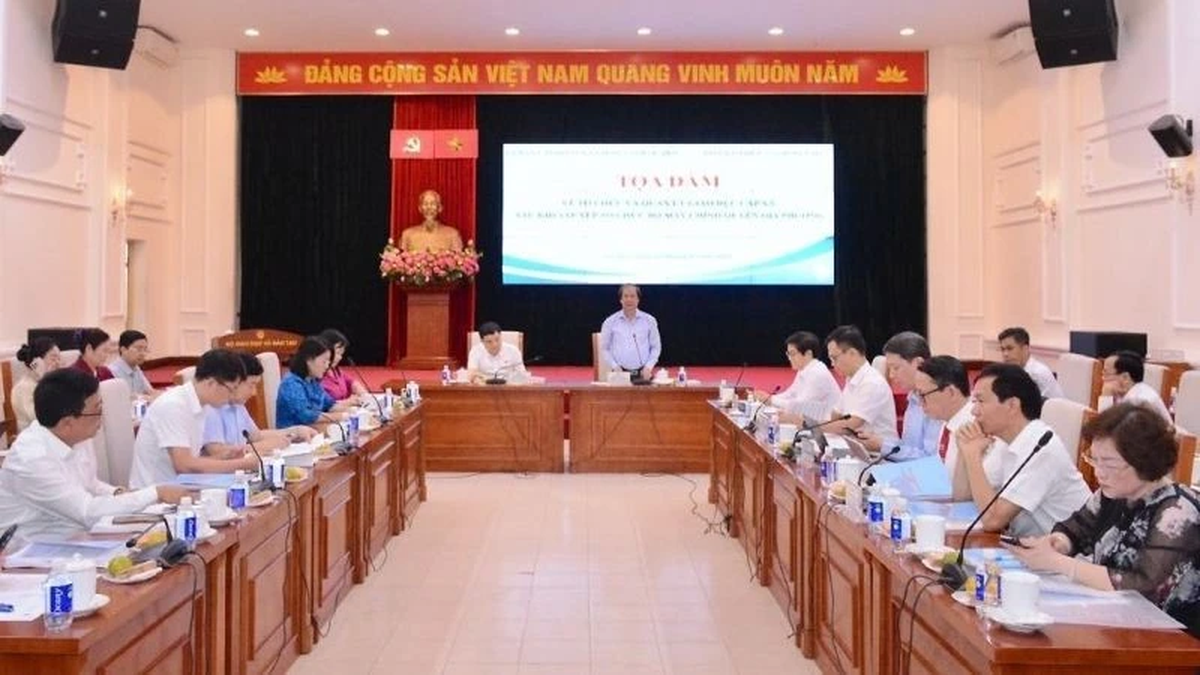In order for the above policies and guidelines to be effective, in addition to propaganda and orientation work, there is a great need for more specific support and guidance... to help the model conversion process become easier and more convenient.
Striving for 2 million enterprises nationwide by 2030

Every year, Mr. Nguyen Cong Khanh's grocery store (Thanh Xuan Bac Ward, Thanh Xuan District) pays a lump-sum tax of about 50 million VND. Although he has been encouraged many times to register as a business, Mr. Khanh is still hesitant. The change in tax rates and a series of related administrative procedures have caused him and many other business owners to continue to delay, even though they know that converting from a business household to an enterprise will bring many better business opportunities.
“Now there is a new regulation, if I convert from a business household to an enterprise, I will be exempted from paying taxes for 3 years, a total of about 150 million VND. In addition, the new enterprise will also receive many other supports,” said Mr. Khanh.
In addition to tax exemption, households and individuals doing business will be provided with free legal consulting services, training on business administration, accounting, tax, and human resources for small and micro enterprises. As a household selling clean agricultural products on Thai Ha Street (Dong Da District), Ms. Hoang Thi Hanh said that her store is currently maintaining sales management software for about 70,000-80,000 VND/month. Therefore, if she is supported with this software, she can reduce some of her operating costs.
A series of mechanisms and policies to support business households and promote their transformation into small and medium-sized enterprises have been issued in Resolution No. 198/2025/QH15 dated May 17, 2025 of the National Assembly on a number of special mechanisms and policies for private economic development; Resolution No. 139/NQ-CP dated May 17, 2025 of the Government promulgating the Government's Plan to implement Resolution 198/2025/QH15.
One of the notable contents of Resolution No. 198/2025/QH15 is the abolition of lump-sum tax on business households and individual businesses from January 1, 2026. This policy aims to ensure transparency in business household operations and create equality in tax regimes between business households and enterprises. Along with tax incentives for small and medium-sized enterprises, many other policies also aim to motivate business households to innovate and develop.
Previously, on May 4, 2025, the Politburo issued Resolution No. 68-NQ/TU on private economic development, setting a target of 2 million operating enterprises in Vietnam by 2030; the growth rate of the private economy will reach 10-12%/year. By 2045, there will be at least 3 million enterprises operating in the economy, contributing about 60% of the Gross Domestic Product (GDP).
However, looking back at the target set in Resolution No. 10-NQ/TU dated June 3, 2017 of the 5th Conference of the 12th Party Central Committee on developing the private economy into an important driving force of the socialist-oriented market economy, which is to have at least 1 million enterprises by 2020 and more than 1.5 million enterprises by 2025, has not yet been achieved. Therefore, special policy mechanisms are extremely necessary.
Dr. Can Van Luc, member of the National Financial and Monetary Policy Advisory Council, assessed that the new regulations and policies demonstrate the determination of the Party and State in developing the private economy. At the same time, the transition to the enterprise model will help business households improve their professionalism and competitiveness.
Support policies must be deep and strong enough.
According to Ms. Nguyen Thi Cuc, President of the Vietnam Tax Consulting Association, the country has about 5 million business households and individuals, with 3.6 million households registered to pay taxes. The preferential policies that have been effective since May 17, 2025 have really created conditions for converting business households and individuals into enterprises, because otherwise the goal of having 2 million enterprises by 2030, at least 3 million enterprises by 2045 will be difficult to become a reality.
According to economic experts, many previous support policies were not substantial, deep, or strong enough to encourage households and individuals to turn their businesses into enterprises. Household businesses were afraid of legal procedures, accounting, labor, salary, social insurance, and many other regulations, so even though they were qualified, they still avoided or delayed converting to an enterprise model.
According to the Prime Minister's direction, in the near future, small and medium enterprises will receive comprehensive support from accessing land, production and business premises, renting houses, land as public assets to finance, credit, taxes, fees, as well as improving management capacity... This will be the driving force for households and individuals to boldly transform into enterprises.
“By carefully studying the preferential policies in the coming period, individuals who convert to enterprises will have many advantages. However, what we want most at this time is to be consulted to understand correctly and accurately the benefits we are entitled to, as well as support to make the conversion process easy and convenient,” said Mr. Nguyen Cong Khanh - owner of a grocery store in Thanh Xuan Bac ward, (Thanh Xuan district).
To avoid the fear of individuals and business households who do not fully understand the legal policies, especially the benefits they will enjoy, lawyer Nguyen Thanh Ha, Chairman of SBLaw Law Firm, proposed that, in addition to implementing the support policies recently issued by the National Assembly and the Government, relevant levels and sectors should advise, propagate, and resolve the difficulties that business households are facing.
Deputy Secretary General, Head of Legal Department, Vietnam Federation of Commerce and Industry Dau Anh Tuan:
Procedures need to be easier and more friendly

The target of having 2 million enterprises by 2030 according to Resolution No. 68-NQ/TU of the Politburo is a "KPI" for localities in assessing socio-economic development. The main solutions proposed by the resolutions of the National Assembly and the Government such as tax exemption to encourage business households to transform into enterprises are very practical. This is a highlight that not only helps Vietnam's business environment become more attractive and friendly.
However, in addition to tax exemption policies, accounting regimes and business procedures also need to be adjusted in a more easy and friendly direction, then many households will boldly convert into enterprises. This is the key point, not just a matter of procedures, but the process of enhancing the role of the private economy in the national economy. In the implementation process, the most important thing is still to change from a management mindset to a mindset of supporting and accompanying enterprises at all levels and sectors.
Dr. Nguyen Thi Cam Giang, Faculty of Finance, Banking Academy:
Creating a solid foundation for the goal of private economic development

Resolution No. 198/2025/QH15 of the National Assembly on a number of special mechanisms and policies for private economic development is considered an important step in perfecting the legal environment, creating a solid foundation for the private economic sector to develop strongly, contributing positively to national economic growth. One of the highlights is the regulation on exemption of corporate income tax for 3 years from the date of first issuance of the business registration certificate for small and medium enterprises.
This policy first of all helps to significantly reduce the financial burden on small and medium-sized enterprises in the start-up phase, which is the most risky and unstable. Thanks to that, enterprises have the conditions to focus resources on production, invest in technological innovation, expand the market, improve competitiveness; help increase the rate of enterprises maintaining sustainable operations, reduce the situation of dissolution or cessation of operations in the early stages.
Executive Director of the Faculty of Finance and Banking, Nguyen Trai University Nguyen Quang Huy:
Abolishing tax is the right move

I believe that the transition from the lump-sum tax method to tax declaration and payment is a step in line with the direction of modernizing tax management and promoting sustainable development of the private economic sector. For business households and individuals, this regulation will open up opportunities to access a more transparent management system, improve accounting and financial capacity, and at the same time create more favorable conditions for accessing credit and expanding business scale in a professional manner.
Of course, this transformation requires careful preparation in terms of technology, digital infrastructure, as well as support from tax authorities. The application of electronic invoices, tax declaration support software, and training programs will play an important role in helping business households adapt and operate effectively under the new mechanism. This is a positive step, creating a long-term foundation for sustainable growth of the private economy.
Hoa - Huong performed
Source: https://hanoimoi.vn/chuyen-doi-cac-ho-ca-nhan-kinh-doanh-thanh-doanh-nghiep-can-them-nhung-ho-tro-dan-dat-cu-the-703476.html



































































































Comment (0)